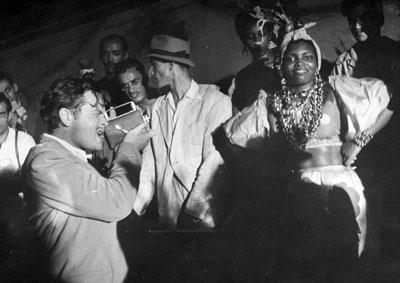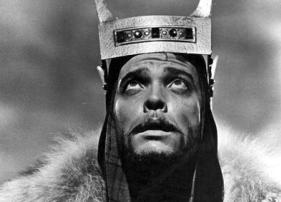1939-1942—It's All True in Context
This program investigates the events surrounding the collapse of Orson Welles' Hollywood directing career following the critical success of the 25-year-old filmmaker's feature debut-the controversial 1941 classic, Citizen Kane. The evening will center around newly preserved footage from Welles' suspended 1941-1942 project, It's All True contextualized with scenes from Kane and from The Magnificent Ambersons, two Welles projects of that period that were completed in ways different from his original conceptions. (Ambersons, which could well have been the director's masterpiece, was especially savaged by RKO Radio Pictures.) That such diverse projects as Ambersons, Journey into Fear, and It's All True were simultaneously in the works before Welles was fired by RKO in July 1942 is remarkable, and together they provide a fascinating glimpse into Welles' artistic development and his complex early dealings with the Hollywood system.
Welles scholar Joseph McBride—the author of three books on the director, including the forthcoming "What Ever Happened to Orson Welles?: A Portrait of an Independent Career" (University Press of Kentucky)—will present a lecture with film clips, focusing on this period when an innovative and provocative young artist was briefly allowed the full resources of a major studio. Anything seemed possible for Welles in Hollywood, before his career turned into one of vagabond independence.
Catherine Benamou of the University of Michigan, whose book "It's All True: Orson Welles's Pan-American Odyssey" is pending from the University of California Press, will follow McBride's lecture with a presentation on It's All True. Welles conceived It's All True in 1941 as a multipart semi-documentary film to be produced under his RKO contract. Transformed into a Good Will extravaganza co-sponsored by the U.S. Coordinator of Inter-American Affairs for production through RKO, the project was ultimately canceled by the studio when it came to view Welles' artistic and political radicalism as a serious liability.
It's All True includes "My Friend Bonito," a short narrative about a boy and a bull based on a story by Robert Flaherty, that was shot by director Norman Foster in Mexico beginning in September 1941. Welles himself directed a dazzling documentary on the Brazilian Camavalin early 1942, using footage shot in Rio de Janeiro in both black-and-white and Technicolor. The most celebrated section of the multipart film today is "Jangadeiros" or "Four Men on a Raft," a staged reenactment of the epic journey of four fishermen (jangadeiros) from the shores of Fortaleza in Brazil's Northeast to Rio to petition Brazilian dictator Getulio Vargas for socioeconomic reforms. A fourth episode would have focused on the life of jazz giant Louis Armstrong, but it was never filmed owing to the ouster of Welles' Mercury Productions from RKO in July 1942.
–Joseph McBride and Catherine Benamou
Selected footage from It's All True preserved from the original 35mm nitrate camera negative and from 35mm nitrate positive work print fragments. Laboratory services provided by YCM Laboratories. Special thanks to: Eric Aijala, Catherine Benamou. Bill Krohn, Joseph McBride, Myron Meisel.
Running time: approx 90 min.






 Mobile Navigation
Mobile Navigation


